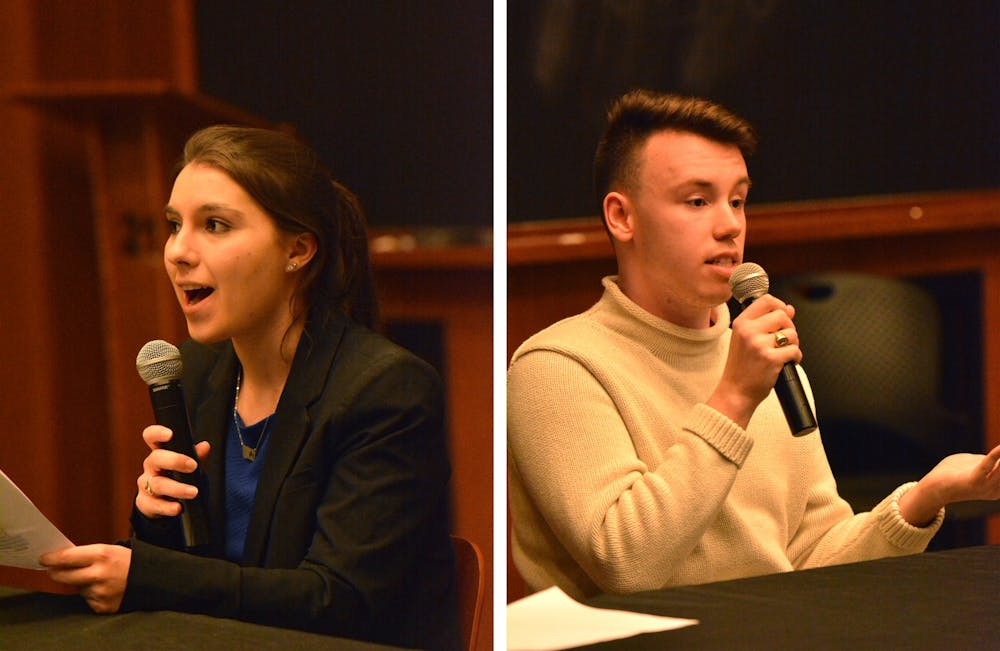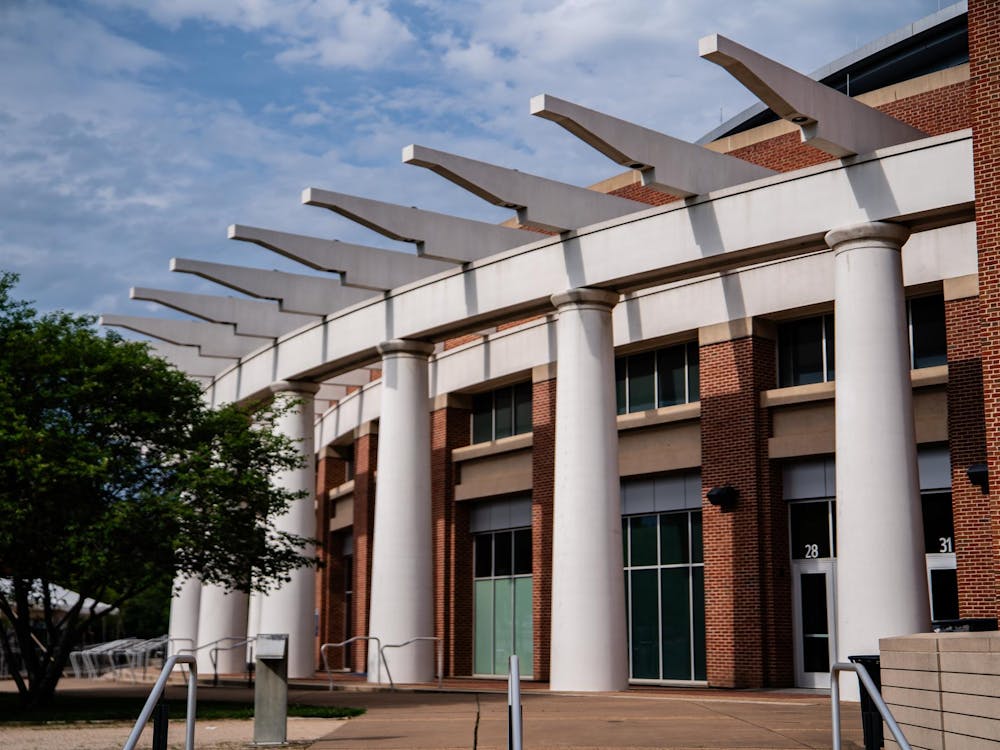The Cavalier Daily and University Board of Elections co-hosted the fourth annual Student Council Presidential Candidate Forum Monday night with third-year College students Ellen Yates and Hunter Wagenaar presenting their platforms as prospective Student Council presidents.
Yates and Wagenaar took turns answering questions formulated by The Cavalier Daily and audience submissions. Around 30 students were in attendance and the live-stream of the event had over 8,200 views as of press time.
The forum ended with Wagenaar ending his candidacy for president in his closing statement. Wagenaar cited alleged violations of candidate endorsing procedure policies as one of the reasons for his final decision to withdraw from the race. UBE is currently investigating the claims.
Yates’s platform
Yates is Student Council’s current Vice President for Administration. She has been involved in Student Council since her first year at the University, and has served in capacities that include the Chair of the Student Life committee and the Chief of Cabinet.
In an interview with The Cavalier Daily, Yates described how through her experience, she has been privy to the great amount of good that the Student Council has done in the community but is also very aware of its shortcomings.
“We’re trying to use that to support the students outside the organization doing really really good work and empowering them to be change-makers at University,” Yates said.
The three planks of Yates’s platform are presence, partnership and accountability. As president, Yates would work on transforming Newcomb Hall into a student resource hub, complete with satellite offices for Student Financial Services and a Student Health clinic.
She also plans to build upon work she completed during her years with Student Council, such as implementing free printing on Grounds, which she first explored through a pilot program as the Student Life Chair. Yates also recently established a student workers ad-hoc committee to support and advocate for student workers and extend the $15 an hour Base Wage — which went into effect for benefits-eligible University workers Jan. 1 — to student workers. The classification determined that student workers, despite working the same amount and in the same position, would be paid less due to their status as students.
For Yates, the partnership branch of the platform is the most important and is a vital way to combat students’ lost faith in Student Council. For an increase in partnership, Yates described her Inter-Organizational Coalition Model that would manifest in the form of rountables between organizations and students working to address particular issues.
In terms of accountability, Yates’s focus is on Speak Up U.Va. — a website where students were able to provide input to Student Council that has fallen largely into disuse in recent years. Yates explained how she would re-work this platform and move it to a Facebook page where students could submit their concerns and choose to be anonymous.
Yates’s running mates are third-year College student Shefalika Prasad, up for re-election as Vice President for Organization, and third-year Curry student Darynha Gnep, currently the Chair for Student Life and running for Vice President of Administration.
Wagenaar’s platform
Wagenaar previously served as Student Council Representative for the College in 2019, and has also served as Chair of the External Affairs Committee and Chair of the Renaming, Recontextualizing, and Removal Committee. He is not currently a member of Student Council.
In his opening statement, Wagenaar described his view of the current Student Council as a body that has lost the faith of students, that leads from above and that takes credit for the work of others.
“We need to put the student back in student self-governance,” Wagenaar said. “We need to make Student Council work for students, rather than themselves.”
Wagenaar’s platform involved the creation of a new Student Council position, the Vice President of Student Resources, to focus on the advocacy of student workers along with the anxiety around first-year housing.
He proposed the elimination of Student Council offices in Newcomb with the purpose of turning them into storage space for Contracted Independent Organizations, stating “leaders make sacrifices.”
Wagenaar also talked about streamlining and focusing Student Council resources, such as the creation of a CIO funding application to eliminate stresses for CIOs, and the creation of a Cultural Arts Fund to fund art projects from cultural organizations, as he claimed the current iteration of the Student Arts Fund — which disburses funds to students creating art projects but does not have a multicultural focus — does not focus enough on the needs of marginalized students.
Prior to dropping out of the election, Wagenaar’s running mates were second-year College student Ilyas Saltani for Vice President of Administration and third-year Architecture student Veronica Merril for Vice President for Organization. Together, they proposed a platform of overhauling the current Student Council system in their campaign.
Merril withdrew from the election following the forum, but Saltani is still in the race for VPA.
The debate
Yates and Wagenaar offered differing opinions on several issues related to the organization of Student Council, including transparency, campaign promises and lobbying practices.
Yates commended the current Student Council President, fourth-year College student Ellie Brasacchio, but added that she would like the Council to approach issues from more of an outward facing perspective in the future. Wagenaar cited free menstrual hygiene across Grounds as a positive change implemented by the current administration, but argued that the presidency had become too centralized in the past year, which resulted in a decrease of the legislative body’s power.
Both candidates agreed that the transparency of Student Council is a major issue moving forward. Yates disagreed with Wagenaar’s idea of creating a new role, Vice President for Student Resources, to tackle transparency, as she said it would further bureaucratize the system.
Wagenaar raised an issue with Yates’s plan to encourage student leaders to participate in Student Council roundtable discussions and attend general body meetings.
“That’s not the form of leadership I believe in,” Wagenaar said. “I believe that student leaders on Student Council should be going to students.”
To combat declining student engagement in Student Council, Wagenaar argued that the 12.6 percent turnout rate of students in last year’s election was a result of discontent with the organization. He argued that this lack of enthusiasm could be resurrected through the establishment of new and exciting projects and the elimination of the institutions no longer seen as relevant.
Yates pushed back against an overhauling of the Student Council institution, instead arguing that condensing and focusing Student Council into a more efficient process will increase student enthusiasm.
Throughout the forum, Yates emphasized her experience in Student Council that has equipped her with the knowledge of the organization’s infrastructure and the awareness of what is needed for Council to be a more effective institution.
“I’ve been in Student Council for three years. I have a comprehensive, informed platform and a track record of getting things done,” Yates said.
However, Yates received pushback from audience questions about her coalition model and whether she had received indications that cultural student groups would participate.
Yates explained that the fostering of relationships with leaders of student organizations across Grounds would take time. She clarified that the model was not designed to intrude on multicultural organizations but to offer and share the resources of Student Council.
Yates pointed out Wagenaar’s ties with friends of the University that help legacy students, arguing that this association may have played a role in Wagenaar’s decision to abstain on a Student Council vote denouncing the University’s admissions watchlist. First publicized in 2017 and again brought to light September 2019, the University has used a “watchlist” to track certain applicants who receive an additional review during the admissions process — many of whom are connected to major donors.
Student Council failed to pass a resolution condemning the practice October 2019 after a significant number of representatives abstained from the vote.
Wagenaar explained his decision to abstain from the vote as stemming from the “mess” associated with it, noting that members of the executive body broke from meeting procedure.
The candidates also differed in their approach to Student Council’s relationship with University administration. Yates proposed a working relationship, with students at the table and making decisions with administrators. She gave the example of the Tuition Fees Admission Committee — a group of students that review the tuition plans for the upcoming year — to take place earlier in the year. In its current form, the committee meets after decisions have been made.
Wagenaar disagreed with the characterization of Student Council as a bridge between students and University administrators. Instead, he said the primary goal of the Council should be amplifying students’ voices and interests.
At several points throughout the forum, Wagenaar declined to respond to audience submitted questions regarding his resignation from the representative body and concerns about working with members of the other ticket. Wagenaar declined to comment for this article.
With Wagenaar dropping out of the race, Yates is running unopposed for Student Council president. Voting for all University-wide elections ends Friday, Feb. 28 at 4 p.m. Votes can be submitted electronically at uvavote.com.







